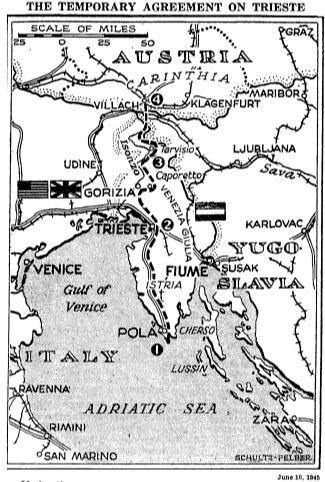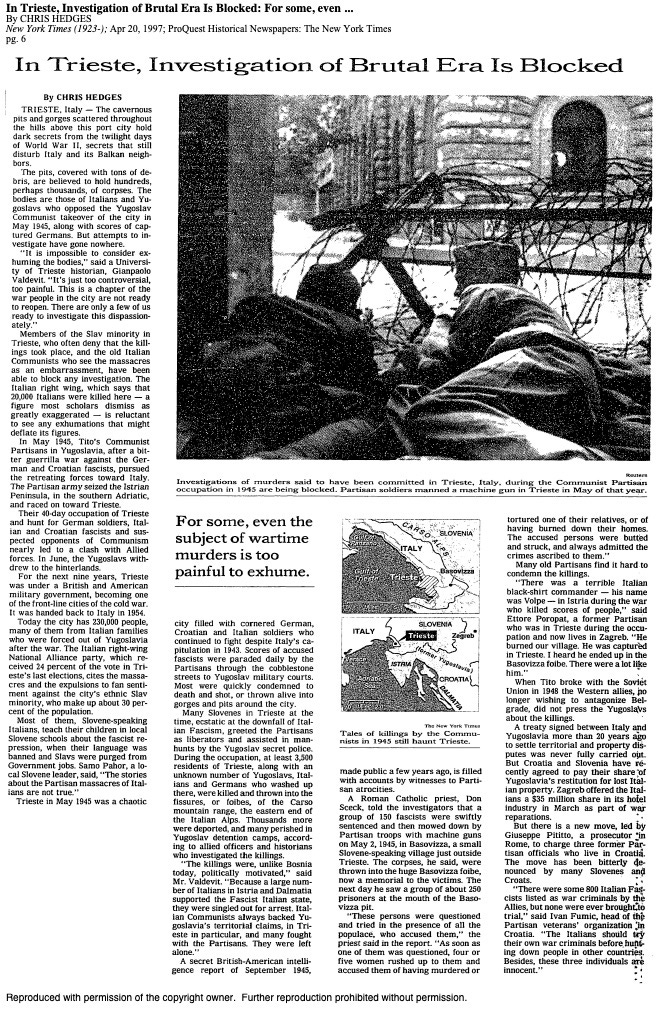In Opapa’s journal from Trieste, Italy in July 1945, he uses one abbreviation regularly: Pz. I was puzzled by this, and wasn’t sure what he meant.
My first guess was that Pz meant “Polizia,” the Italian word for Police. But this didn’t make too much sense. Opapa refers to the Pz leaving hand-grenades in people’s homes after they departed, while the Italian police would (presumably?) still be around after the war. And (hopefully) not planting explosives for civilians.
My next guess was Panzer, the term used to refer to the German military units during World War II. The Germans did occupy Trieste, and they certainly wreaked havoc when they retreated.
But there were a few references that made me question that interpretation as well. Here are some of them:
July 6: “2000 Pz. on the Allied side of the Blue line.”
July 7: “Cramb also heard rumors of Allied personnel held by Pz. will check….Tells about Pz. concentration camp in BOROVICA, near Ljubljana….Relatives bringing food not allowed to go within less than 100 yrds of fence, Pz. guards with MG shoot any prisoner who waves to visitors.”
July 8: “Says Pz take all Italian identity cards and issue new croatian ones.”
The one that really tipped me off was the July 8 entry: “Pz take all Italian identity cards and issue new croatian ones.” Why on earth would a German do that?
Pz., I am pretty sure, refers to the Yugoslav Partisans.
Opapa was very familiar with the Partisans. He had spent the last 3 months of the war with Slovene Partisans after his ill-fated jump into enemy territory. He had written positively about the Partisans during that time, noting that they were under severe attack from the retreating Germans. In his autobiography draft, he noted that he “joined them” in their effort.
In July 1945, however, the Partisans that emerge from his journal do not seem like a liberatory force. They have a concentration camp near Ljubljana, and they are shooting women who come close to the fences to give food to the starving inmates. They left hand-grenades and booby traps in the home of civilians who asked them to conserve electricity. They are militant in their nationalism, taking away Italian identity cards and exchanging them for Croatian ones.
What is going on?
I’ve just started to figure this out. What I know is that Trieste, which lies on the border between Italy and Slovenia, was a highly contested region. Before the war, the city was part of Italy; but prior to WWI, it was part of the Austro-Hungarian empire, along with Slovenia and Croatia. The population was a mix of ethnic Italians, Slovenes, Croats, Germans, Jews, and others.
In the last months of the war, as the Germans retreated, Allied and Partisan forces competed to control the city in the “Race for Trieste.” The first to arrive was the Yugoslav 4th army army, followed by the New Zealand 2nd division (hence Opapa’s frequent references to “New Zeelanders.”
For forty days, from May until June 1945, there was joint occupation of Trieste. During that time, Tito claimed the region for Yugoslavia, and he negotiated with Allied forces. Eventually, on June 9, 1945, Tito agreed to move his troops out of Trieste, and the surrounding region was divided between Yugoslavia and the Allied forces.

While everyone agrees that Tito’s Partisans left Trieste in June 1945, what happened during the forty days of Partisan occupation is still an emotional and hotly debated issue. In fact, it’s so controversial that the history is really not settled. I found an interesting article in the NYTimes from 1997, entitled “In Trieste, Investigation of Brutal Era is Blocked.”
I’ve also found some pretty scary Italian nationalist websites (which I will not link to), claiming that all of the Istrian peninsula should be part of Italy, and alleging that tens of thousands of people were murdered by Tito’s forces. There is definitely a lot of misinformation swirling.
It seems like Opapa’s notations might offer some insight into what was happening, though it is just a narrow slice of “truth.” He was in Trieste both during and after the “40 days.” And from his journal, I’ve gathered that he went on a secret intelligence mission to Slovenia soon thereafter.
More on that tomorrow.




